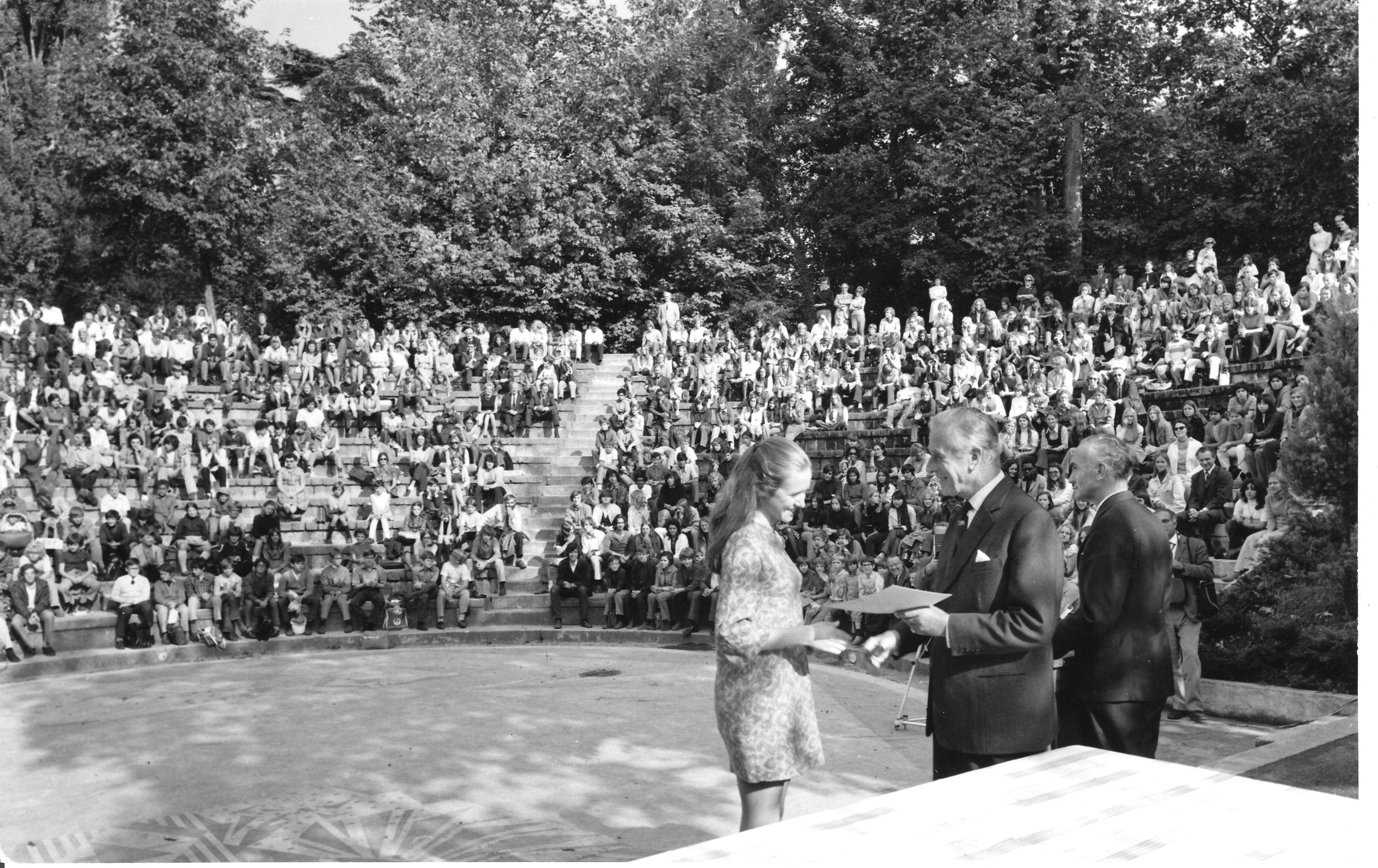International Baccalaureate

Peggy Ray awarded the first International Baccalaureate by Lord Mountbatten in 1971.
Also pictured: René-François Lejeune, Director General, and the assembled school in the Greek Theatre.
Photo by François Martin, scan courtesy of Alejandro Rodriguez-Giovo.
Objectives and Results
As the International Baccalaureate approaches its 50th anniversary, it is a good time to remember the people whose efforts contributed to its successful development and implementation. Many teachers at the International School of Geneva were instrumental in promoting its original concept and attracting numerous educators from around the world to bring the IB programme to fruition.
Gérard Renaud played a key role during the development period. A teacher of philosophy and French literature in the French language programme at Ecolint, Renaud is credited as being a major architect and proponent of the IB from its inception in 1962. His report to UNESCO provides great insight about the experimental period prior to its official launch in 1975.
"Experimental Period of the International Baccalaureate - Objectives and Results," compiled by Gérard Renaud, has been published in its entirety on the UNESDOC web site. It is an interesting read for all participants in the IB programme, and especially for those amongst us who were directly involved in its creation:
Gérard Renaud - Ecolint Author Page
Ecolint Online June 2020
Objectives and Results (Continued)
Feedback from the post about Gérard Renaud helped to shed new light on all of the people involved in the creation of the International Baccalaureate. Phil Thomas writes that Desmond Cole-Baker played a key role in the development of the IB, while former students credit Bob Leach for its inception. This point of clarification centers around the terms: "major architect and proponent" that were applied to Renaud in last month's article. These terms were drawn from the biography published on the International Baccalaureate web site:
Gérard Renaud profile by the International Baccalaureate Organization
Alec Peterson, the first Director General of the IB also gives credit to Renaud, together with Desmond Cole-Baker and Bob Leach, in his 1987 book 'Schools Across Frontiers.' Peterson was involved in creating an academic curriculum for the newly-founded Atlantic College in Wales when he teamed up with Ecolint to form the International Schools Examination Syndicate, which became the International Baccalaureate Organization in 1968.
Desmond Cole-Baker was a teacher and Head of the English section of the International School before heading up the International Schools Association; he was instrumental in generating interest for the IB programme amongst many other international schools being established. He and Bob Leach are generally acknowledged to have come up with the original proposal to create a formalized IB programme, although the idea of an internationally accepted secondary school qualification is often said to have been discussed when the International School of Geneva was founded in 1924.
David Beare remembers sitting the first Modern History exam in 1964, as part of the syllabus created by Bob Leach. The Modern History syllabus was the first subject to be developed and trialed as part of the programme which eventually became the International Baccalaureate. The Modern History subject itself was considered to be an innovation, as most secondary school history subjects at the time only covered topics that had occurred before living memory.
For his part, Gérard Renaud was instrumental in gaining support for the fledgling programme from the French government to finance international conferences held at Centre International d'Etudes Pedagogiques, Sevres in 1967 and 1974. Privately, he is acknowledged to have gained French support for the programme name (Baccalaureate) and for the philosophical content in the Theory of Knowledge course. Prior to joining the staff of the French language programme at Ecolint, Renaud taught at a number of French overseas schools and was well connected to the French education ministry.
A second point of clarification revolves around the IB anniversary. The 50th anniversary of the IB was celebrated in 2019 to commemorate the time when the original International Schools Examination Syndicate became the International Baccalaureate Organization. The official launch of the IB was in 1975 according to Renaud's report to UNESCO, while diplomas had been awarded before that time to students who had completed the programme during its experimental phase. The actual inception of the IB can be traced to 1962 with the creation of the Modern History syllabus and examination.
There are of course many other educators and visionaries who were involved in creating and developing the IB to its current form, notably: Ruth Bonner at Ecolint; the close collaboration between Atlantic College and Ecolint during the experimental period; the United Nations International School in New York which adopted the IB as its sole secondary school curriculum; the American industrialist and internationalist Blouke Carus who brought the programme to the United States; the Carnegie Endowment; Ford Foundation; and the list goes on.
"Experimental Period of the International Baccalaureate - Objectives and Results," compiled by Gérard Renaud, is published in its entirety on the UNESDOC web site. It is an interesting read for all participants in the IB programme, and especially for those amongst us who were directly involved in its creation. Additional books listed on Renaud's alumni author page provide many more insights about the people who were involved:
Gérard Renaud - Ecolint Author Page
Ecolint Online August 2020
Objectives and Results (Continued)
As part of our ongoing discussions about the people who created the International Baccalaureate, Anne Goormaghtigh Carcagno writes to remind us that her father, John Goormaghtigh, also played a key role in its development. At the programme's inception, Goormaghtigh chaired the Board of Governors of the International School of Geneva, while employed as Director European Centre for the Carnegie Endowment for International Peace.
John brought an important perspective to education for world peace as a result of active service and imprisonment in the concentration camp of Dachau during the Second World War. He believed that a truly international education programme would lead to a more tolerant and peaceful world, while contributing to intercultural understanding.
This commitment and dedication led Goormaghtigh to become president of the original council of the International Schools Examination Syndicate, which ultimately became the IBO, and then to serve as founding President of the IBO Council until 1981. As a parent at Ecolint, he also devoted much of his time to voluntary activities at the school.
John Goormaghtigh profile by the International Baccalaureate Organization
Ecolint Online October 2020
Article by Phil Thomas
Phil chronicles people at the International School of Geneva who were involved in the development of the International Baccalaureate.
Ecolint and the Origins of the International Baccalaureate
Philip Thomas
Ruth Bonner
As part of our Ecolint Centenary review of people past and present who have contributed to the development of international education, Lynette Sze (Xiaojing Shi) asks for information about the role that Mrs. Ruth Bonner played in the early days of the International Baccalaureate. Ruth Bonner was one of the early participants who were involved in the IB project. She became a keen proponent of the programme by traveling to schools around the world, encouraging the adoption of the IB curriculum.
Phil Thomas responds that Ruth was closely involved from the very beginning of the International Baccalaureate in 1964, when the International Education Exam Syndicate was established. The first two employees were Gene Wallach, as executive secretary, and Ruth Bonner as the office manager, both appointed by Desmond Cole Baker. Gene soon rejoined the Ecolint staff, while Ruth stayed on with the International Baccalaureate until she retired in the 1980s.
The original IB office was housed at the International School before moving to nearby Cologny, where Ruth was joined by Alec Peterson as the Director General and Gerard Renaud from the Ecolint French Language Programme. At that time the IB staff comprised fewer than a dozen people, a very different picture from nearly one thousand people who work for the IBO today.
Ruth was at the heart of the IB organisation and was completely dedicated to its success. Phil Thomas came to know Ruth Bonner very well with their families becoming neighbors at the school apartments where they lived in Pont Ceard in Versoix. Phil also recalls that Ruth appreciated her friendship with Lynette, whose class was among the first to sit for the IB examination, and was very proud of Lynette's many professional achievements.
Everyone is invited to share personal remembrances of Ruth Bonner and her colleagues by writing to us.
Ecolint Online March 2023
Ruth Bonner (Continued)
As part of our Ecolint Centenary review of people past and present who have contributed to the development of international education, Mary Winskill Roosevelt adds her remembrances of Ruth Bonner during the early development of the International Baccalaureate. As one of the original participants who were involved in the IB project, Ruth Bonner was a keen proponent of the programme, encouraging the adoption of the IB curriculum to schools around the world.
Mary fondly remembers Ruth Bonner and Elizabeth Adossides, who provided valuable assistance in planning for her trip across Africa in 1966. Mary traveled all over that continent sharing plans for the developing IB. Ruth and Elizabeth also helped Mary in drawing up documentation for the subsidiary and advanced levels of the IB curriculum. While Mary's expertise was mainly focused on creating an International Primary School preparatory curriculum for the IB, she found herself representing the entire fledgling program.
All of the paper work and correspondence between Mary, Ruth and Elizabeth have been retained from the Africa trip, together with papers from the planning for an international conference held at Ecolint the following year. Together, they document an exceptional collaboration that resulted in the success we have witnessed over so many years.
Everyone is invited to share personal remembrances of Ruth Bonner and her colleagues by writing to us.
Ecolint Online May 2023
eBook Edition from UNESDOC:
Experimental period of the International Baccalaureate: Objectives and results
Related Reading
Schools Across Frontiers By Alec Peterson
The International Baccalaureate - Pioneering in Education By Ian Hill, Mary Hayden
Supertest - How the International Baccalaureate Can Strengthen Our Schools By Jay Mathews, Ian Hill
Return to Tributes to Ecolint Teachers
2024-04-20 by: Ecolint Online